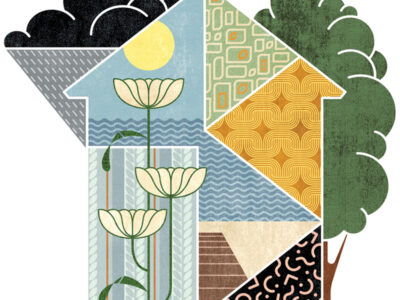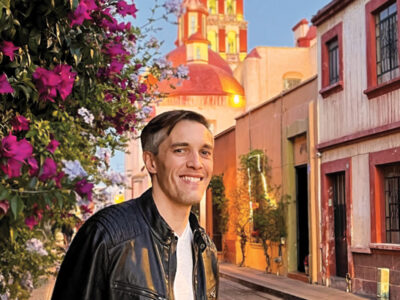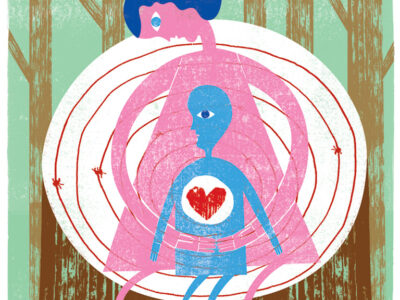
Four decades after Vietnam, a former soldier mounts a different mission.
By Bill Gould, MD | When I crawled aboard a Freedom Bird on July 4, 1969, after a year as an Army combat officer, I hoped the nightmare of Vietnam would end with my flight away from it. But my memories did not fade, especially those of the villagers of a rice-farming hamlet 40 miles north of Saigon who, more than once, had saved my life. I had spent nine months of my tour living among them as a civil affairs officer, and the passage of decades could not extinguish them from my thoughts. I wondered about Mr. Long; Mr. Khai; the ancient, fragile Mrs. Binh; Miss Hue, the fetching schoolteacher. What had their eyes seen since I’d left? How had the war’s end and the new social order changed their lives? What had become of the place I’d left behind?
But after Vietnam there was graduate school, and then medical school, and a xenophobic government in Hanoi that could not entertain for even a moment the possibility of allowing a former enemy soldier, no matter his intentions, onto that sacred soil for which millions of their countrymen had died. So the decades passed by, and my memories hardened as though set in amber.
For years, Vietnamese restaurants were the closest I could get. So perhaps it was appropriate that a young waiter at one near Seattle, soliciting donations for a group of college students who were organizing a medical mission, set me on the path I’d been seeking. Instead of writing a check, I wrote my name and email address on the back of our bill, and asked him to forward it to the head of the group. Perhaps they needed another doctor, or just another pair of trained hands. So it was that I found myself in the steaming old imperial capital of Hue, loading a bus with bursting cartons of donated medicine, exactly 41 years after I had left.
With me were several dozen Vietnamese-American pre-med, pre-dental, pre-pharmacy, and pre-optometry students from the University of Washington, the children of refugees who had fled their country in leaky boats at the end of the war. These were the exceptional children of exceptional mothers and fathers whose capital crimes had been to work as janitors or cooks at American PX posts, or on US base camps across the country, burning the feces from American latrines. Their parents’ nightmares made mine pale in comparison. Many of their older male relatives had spent years in “re-education camps,” small mud and straw huts hidden in the jungle into which 60 or 70 fathers, brothers, and sons were stuffed day and night for five to 15 years. One wizened man told me he had languished for seven years in a concentration shed never knowing his eldest son was captive on the other side of a wall separating the hut into two cells.
Having woken before dawn to pack the bus with a 10-day supply of pills to cover ills ranging from asthma to worms, we gulped down a breakfast of pho soup and “thousand-year-old eggs” before assembling to start the mission for which these kids had skimped and saved for a year. But Lin Vu, a pre-med student who doubled as our no-nonsense, artillery shell of a project director, parted the sea of blue scrubs and called out for quiet. “Listen, our first clinic has just been cancelled,” she said. “Some sort of police action. The cops are afraid that concentrations of college students are a threat to national security.”
There were groans and a few hoots of derision, but Lin Vu cut them off in a snap. “Quiet. I don’t want to hear it. This is Vietnam, not Seattle. We’re in their country, not ours, okay?” She took a deep breath. “So, instead, we’re going to visit two orphanages,” she said. “Anybody ever been to an orphanage in Vietnam?”
Mine was the only hand to creep up, and my knee-jerk reaction was to spout out an excuse to dodge this duty. I had no intention of revisiting that horror. I had spent many nights stealing away to an orphanage in Xuan Loc, east of Saigon, delivering food my jeep driver and I had liberated from the trashcans behind the Army mess hall. Armed with slimy liver, spoiling milk, and rotting apples, we would dash in on nights when there was a lull in the fighting to feed our precarious charges: emaciated urchins swimming in feces, nude but for the bare threads of ancient shorts that were usually a dozen sizes too large for the four-year-olds who weighed 23 pounds, if that.
But the kids called out as I tried to sneak away, “Hey Doctor Bill, better hurry. You want to practice your Vietnamese, don’t you?”
Four hours later, after getting tangled up in the ancient lanes of the countryside, we rolled to a stop in front of a well-built schoolhouse crested by a bone-white crucifix sparkling in the dawn light. Sister Huong emerged slowly from within the academy, ushering us single file into an airy hall, warning me in gestures not to brush against the freshly painted stucco. Two dozen children lolled on mats, their bodies dwarfed by the multicolored plastic pre-school chairs. Some of the orphans looked up and chortled; a petite lass in a freshly laundered, sequin-studded pink jumper strained to lift her head, but hydrocephalus had rendered it so large that she lacked the strength, and she just lay, panting.
Sister Huong invited us to feed the patients, and I drifted toward Thu, a six-year-old with a syndrome as alien as the diseases we would encounter in the coming weeks. He grasped my fingers tightly, gurgled in delight over my sketch of Bullwinkle J. Moose, then cried out again when I gave him a kissing-monster smooch on his freshly shampooed crew cut. As I lifted the spoon from his thick porridge, he positively shrieked—clearly this was the best day of his life, I thought—but Sister Huong flew over and whispered behind her hand, “That scream means he is very distressed. Thu only lets women feed him.” So one of our particularly comely young students slipped into my seat, and Thu lifted her soft hand gently toward his mouth. Thu was no fool.
Our first real clinic was in a stretch of countryside abutting the South China Sea, amid the verdant paddies of one of the world’s most fertile tracts. Crops of all kinds shimmered in the gentle sea breeze, tended by peasants who came by the hundreds to our bare stucco building. Rural doctors face a daunting workload that can reach 100 patients a day.
We treated them and dispensed medicines until the electricity died around noon, and with it the pump-driven water to wash our hands. Nonetheless, over lunch the doctors agreed there were far worse places to spend one’s time on Earth than by this idyllic seaside, surrounded by endless square miles of food.
During the afternoon, when a 70-year-old woman grumbled that getting old was no picnic, I countered that at least she was living in heaven. She stared for a moment, then waved a gnarled finger in my face.
“Well, sir, it may be very pretty right now,” she said. “But come autumn and the typhoons, everyone has to pack and move, and I’m never sure where to. Yeah, very pretty. When I shut my door with a piece of string in October, I don’t know if my two cooking pots and my rake will be there when I get back in spring. It’s the typhoons or the bandits. Every year, same thing, for seventy years.” She pinched my cheek. “Does that sound like heaven to you, young man?”
Some days later we reached the city of Xuan Loc, exactly where I had started my tour 42 years earlier, pulling off the highway into a manicured Buddhist compound. A man in lilac-gray monk’s garb and colossal Buddy Holly glasses boomed in a bass voice that set the monastery’s gong vibrating in resonance. He was the uncle of one of the students, and had hastily arranged for us to conduct a clinic after police had thwarted our plans to treat people on the Mekong delta. Arms waving, he directed the creation of a medical facility in a three-sided wooden lean-to that had been, moments before, a simple tool shed.
When the floodgates opened, the monk patrolled the rough-hewn, raw-wood doctor’s tables, thundering out jokes and jibes at patients he knew well. When he planted himself at my table, I took out my hearing aids. In the Hue countryside, we had treated people whose complaints ran from blurry vision to toxic goiters. Here, in the penumbra of Saigon, most of the patients over 40 wore glasses, some of them bifocals. Many of the women weighed over a hundred pounds, and carried medical records showing professional workups and up-to-date treatment. There were the usual headaches, backaches, abdominal complaints, and coughs, but also anxiety and depression—conditions for which we had brought no medications, never dreaming we would be faced with such urban afflictions. So I prescribed Tylenol and multivitamins from our stock, wrote gentle notes about what I had found.
Later, when my flight home rose above Saigon, I traced the highway east seeking a glimpse of Xuan Loc monastery, but the expanse of emerald farmland overwhelmed the fragile settlements. Compared to my memories, Vietnam was recovering—in some places at a supersonic rate, in others less hurriedly, but everywhere peacefully, and for that I sleep more deeply these days. Now when I think of the country I first set booted foot in back in 1968, perhaps my mind will recollect a scene that would have caused my younger self to gape in wonder.
The evening after my 70-year-old patient admonished me that heaven is not always what it seems, I walked through the streets of Hue to another vision of paradise: the Big C, a shopping center with a multilevel parking garage where thousands of late-model motor bikes and cars were packed as tightly as shoots of rice in the paddies by the sea. Masses of well-fed, well-dressed, smiling folks pushed their well-fed, well-dressed, smiling babies in newfangled prams. I cruised up an escalator, past supermarkets, home improvement stores, and clothing outlets, their shelves stuffed, patrons lined up at checkout counters. At the food court on the fourth level, I dug into a couple of pieces of extra crispy Kentucky Fried Chicken, fries, corn on the cob, and pulled on a cold mug of Heineken.
After dinner an attractive young woman approached me holding an eight-month-old. “Excuse me,” she called out, sort of blocking my path. “Do you speak English?”
“I do,” I answered in Vietnamese.
“This is my baby,” she went on in English. I craned my neck over her shoulder, reconnoitering an escape route I could take before she begged for money to raise her child, or worse, a good family to take the child to America. But I leaned too close, for the robust infant grabbed my glasses and set about testing the spring of the frames. “Sir, I am a graduate of the University of Hue. My degree is in English.” Ah ha, tuition for the child. “You see, sir,” she went on, “I want my baby to see all manner of faces. Vietnam is changing. I want her to know the new world. Please sir, is it okay if she looks at you?”
“Looks at me?” I stammered. “Of course she can look at me.”
She whispered, “Thank you so much.” I touched the baby’s beautiful arm, mom touched mine, and just like that was gone.
Bill Gould M’81 (wgouldmd@u.washington.edu) practices medicine in the Seattle area.




